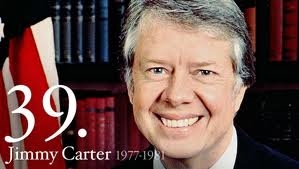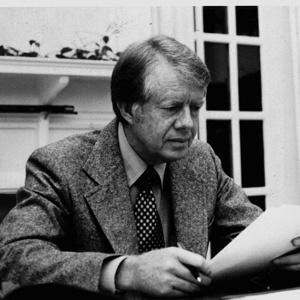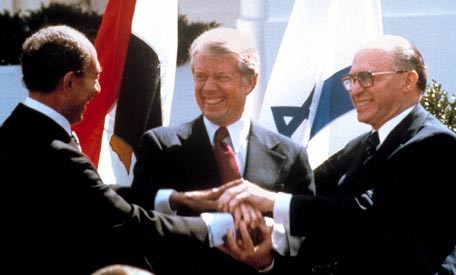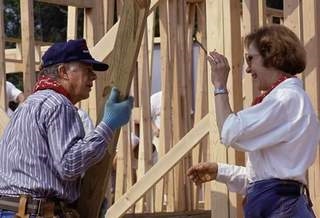 |
| Jimmy Carter (http://www.whitehouse.gov/about/presidents/jimmycarter) |
A failure. A failed president. An ineffective president. A man who did not rejuvenate the economy. These are the images people associate with Jimmy Carter. Nevertheless, when considering his whole life, one notices how he rose above selfishness and apathy. Carter always placed others first, and inspired others to do the same. Jimmy Carter's family and up-bringing shaped how he acted as a man. He grew up in the modest town of Plains, Georgia, where he gained much of his moral character. Unlike most families, Carter's mother encouraged ideas of peace and compassion towards all people. This mindset influenced the way he hoped to serve the country with the well-being of every individual in mind. Even after his presidency, Carter's passion for service and determination was the reason he carried out a valuable term. Carter utilized his determination to promote peace with selfless acts throughout his life.
 |
| Carter in office (http://www.nypost.com/p/news/opinion/editorials/) |
Jimmy Carter acted with determination to overcome the arduous tasks he faced. Obstacles during Carter's life did not hinder him from striving for what he wanted. When he lost the candidacy for governor or Georgia, he remained persistent in serving our country by running for the presidency. "On April 3, 1970, Jimmy Carter announced his candidacy for governor of Georgia. He had lost badly in the 1966 contest for that office, running third in the Democratic primary...Carter formally declared his candidacy for president on January 15, 1975, two days after his term as governor ended, and embarked upon two years of almost continuous travel, enlisting and energizing local and state support organizations" (Berman). Losing the election for governor did not interfere with his aspirations to serve our country. He used the loss to motivate himself in running for a higher position in office, although he could have simply given up and considered himself defeated. This simple act of striving towards his goals despite defeat demonstrates Carter's great ambition and persistence throughout the various aspects of his life. Instead of feeling embarrassed or hopeless, Carter pushed on to become president. At the time, Carter's chance of winning was extremely low. His name recognition was only two percent, yet he still ran a successful campaign by investing all the time and effort he could. After his triumph in being elected president, the abysmal economy created a strong wall which blocked Carter's ability to ensure a thriving environment. "His achievements were notable, but in an era of rising energy costs, mounting inflation and continuing tensions, it was impossible for his administration to meet these high expectations...Carter worked hard to combat the continuing economic woes of inflation and unemployment" (Beschloss). Jimmy Carter not only served during a time of continuing inflation and an energy crisis, but he was also following President Nixon, who disappointed the public when he abused his executive powers as president, in the Watergate Scandal. The task of regaining the trust of the American people demanded much of Carter's patience and careful attention. On top of an economic crisis, the balance between gaining respect while maintaining a strong presidential term proved to be challenging and stressful. Carter had to gain the favor of the public by proving his capabilities as well as defining clear objectives to improve the nation. He did not give up in the face of a weak economy. Through his thoughtful decisions and diligent efforts, Jimmy Carter worked hard to battle the demands of his circumstances. Carter worked earnestly to overcome his losses and create an impact on society.
 |
| Carter with Begin and Sadat (http://www.findingdulcinea.com/news/on-this-day/March/Sadat-and-Begin-Sign-Israel-Egypt-Peace-Treaty.html) |
Jimmy Carter served with a peaceful mindset and hoped to promote peace and equality for all, both internationally and domestically. The idea of a peaceful world was one of the most important causes he undertook. "I would hope that the nations of the world might say that we had built a lasting peace, based not on weapons of war but on international policies which reflect our own most precious values. These are not just my goals -- and they will not be my accomplishments -- but the affirmation of our Nation's continuing moral strength and our belief in an undiminished, ever-expanding American dream" (Ribuffo). Peace was something that played a huge role in Carter's career. Even from the start of his presidency, he supported human rights and peaceful action openly. When faced with the pressing ordeal which involved instigating a series of peace talks between Egyptian President Anwar Sadat and Israeli Prime Minister Menachem Begin, Carter played the role of a mediator while reestablishing communication between the two. It wasn't with harsh words or hostile actions that Carter was able to accomplish this task, but with his clear moral standings about living with peace. With these high hopes of peace in mind, Carter used his position as president to influence how others acted. He did not advocate these ideas for personal gain, but rather, for the improvement of society. After a lifetime of peace efforts, the international community awarded him the Nobel Peace Prize in 2002. Along with international peace, Carter also strongly advocated human rights and equality at home. "He set himself apart from others by showing his concern for all members of all races, which could be traced back to his mother's refusal to accept many of the deep South's racist traditions" (Ed). Even before his presidency, Carter was acutely aware of the hardships many African-American people faced. "More than anyone else in my family, even more than my own father, I understood the plight of the black families because I lived so much among them" (Jimmy Carter). Since he grew up with African-American servants and farmers, Carter was very much involved with their lives. When asked to join a group which opposed the new "non-segregation" laws, he declined. Ignoring these requests did affect his popularity, but he still stuck to what he believed. He stood firm on the topics he felt needed justice,with peace as his ultimate goal. Not every effort was successful, but he never gave up trying.
 |
| Mr. and Mrs. Carter building houses (http://www.history.com/photos/jimmy-carter/photo15) |
Jimmy Carter's unselfish achievements have improved many aspects of society, especially for the poor. From before he was elected president, Carter knew how he wanted to act as leader. He hoped not to be dictator of people's lives, but someone who cared for the lives of others. This mindset carried into his presidency with great passion. "Carter had clear ideas about the role of the president. He would not be a ruler above the people but rather would be directly responsible to them, obligated to defend the general interest against special interests. It was his responsibility to identify and pursue issues of principle, to make difficult choices, and to press forward no matter how hard the task" (Berman). As president, Carter was more focused on helping and influencing others than wielding and flaunting the fame and power he possessed. While he could have focused entirely on the economy and his popularity, he chose to dedicate himself to the the service of others. Habitat for Humanity is one way he expressed his compassion for others. "Furthermore, Carter became a leading member of Habitat for Humanity International in 1984, an organization that builds housing for the poor. The Jimmy Carter Work Project sponsored new housing in cities in the United States, Mexico, India, eighteen African nations, and the Philippines, projects in which Carter himself frequently worked alongside other volunteer construction workers" (Ribuffo). Even after his term in political office ended, Carter continued assisting the less fortunate by making their lives easier. Mr. and Mrs. Carter volunteered their time to create homes for different families. Their involvement in Habitat for Humanity brought great national visibility and caused many people to take interest in the organization's work. Carter often worked alongside the people deemed "less fortunate". Once he stated, "Habitat has opened up unprecedented opportunities for me to cross the chasm that separates those of us who are free, safe, financially secure, well fed and housed, and influential enough to shape our own destiny from our neighbors who enjoy a few, if any, of these advantages of life" ("Jimmy & Rosalynn Carter and Habitat for Humanity"). Although Carter did not let the fame of being president affect his leadership, he used his popularity to help others, both during and after his presidency.
Serving with determination, peace, and selflessness while helping others, Carter's attitude was consistent in the many stages of his life. From never quitting during his presidential campaign, to investing all of his time and efforts in aiding the less fortunate, Carter displayed true admirable characteristics. Although others believed he was a failure, Carter did not let this stop him from creating positive change. He deserved the appreciation of the Nobel Peace Prize, but he would have done everything he did regardless of the recognition. That is what stands out to me the most about this man. Carter inspires me not only because he stayed true to his dreams, but because he also used his success for the improvement of others. "Carter has devoted his career since leaving office to trying to achieve peace and help humanity" ("Carter, Jimmy."). Decisions he made during his lifetime were always guided by a compassionate and willing heart. He governed with a combination of law and heart, which is extremely rare in political leaders. This is the type of leader every nation deserves.
Works Cited
Berman, Milton. "Jimmy Carter." Seventies In America (2006): 1. Biography Reference Center. Web. 25 ,Mar. 2012.
Beschloss, Michael, and Hugh Sidey. "James Carter." The White House. White House Historical Association. Web. 26
Mar. 2012.
"Carter, Jimmy." UXL Encyclopedia of World Biography. Ed. Laura B. Tyle. Vol. 3. Detroit: UXL, 2003. 379-383.
Gale Virtual Reference Library. Web. 27 Mar. 2012.
"Jimmy & Rosalynn Carter and Habitat for Humanity." Habitat for Humanity Int'l. Habitat.org. Web. 27 Mar. 2012. .
Ribuffo, Leo P.,"Jimmy Carter." Great Lives From History: The Twentieth Century a(2008): 1. Biography Reference
Center. Web. 21 Mar. 2012.
Page created on 4/20/2012 12:00:00 AM
Last edited 11/11/2018 6:04:44 PM
